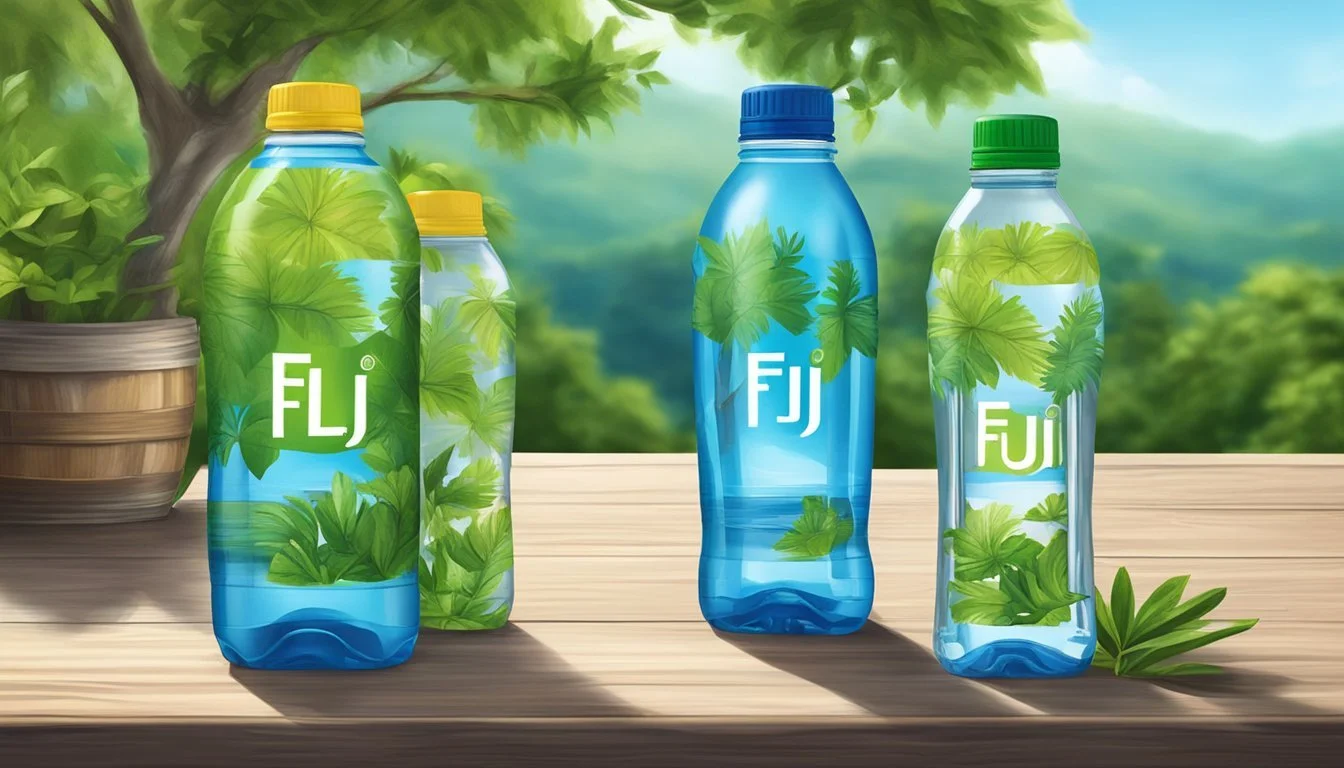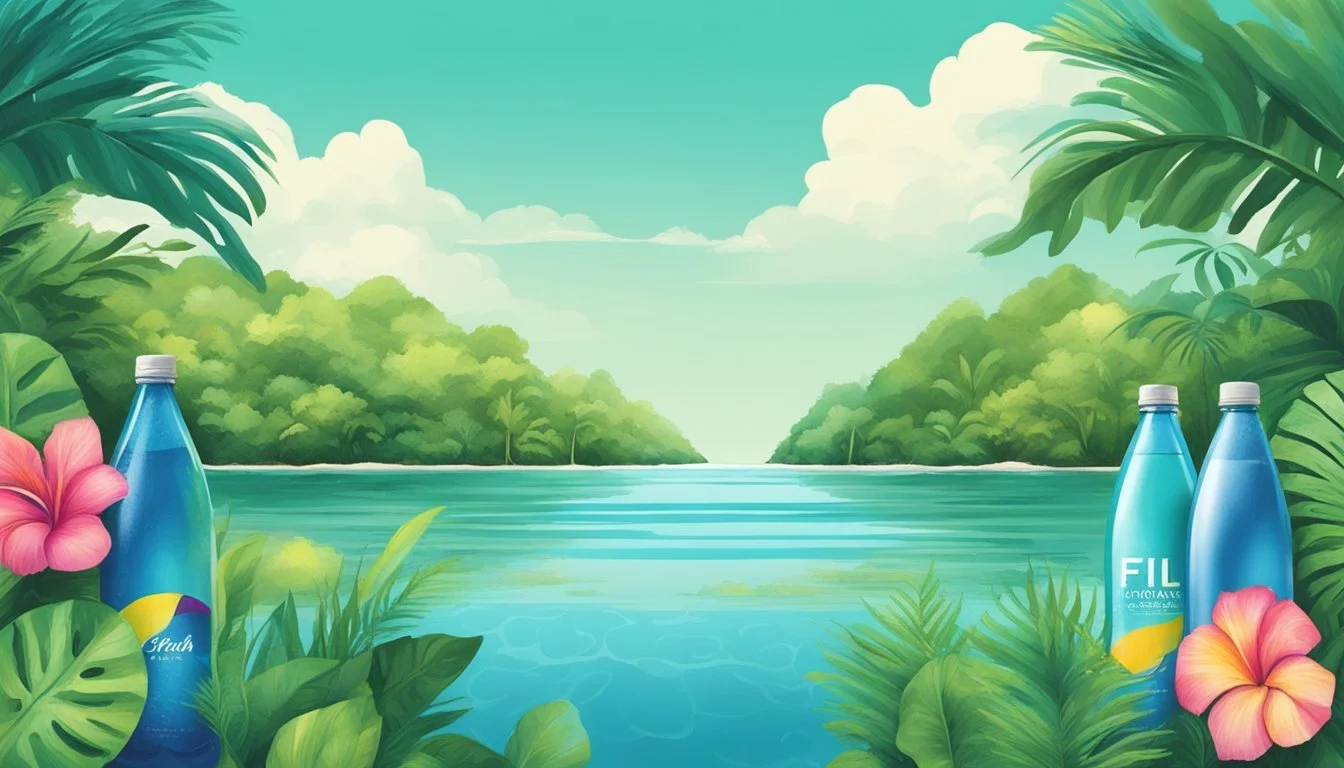Fiji vs. Ophora
Comparing Premium Bottled Waters
When it comes to bottled water, the choice between Fiji Water and Ophora often leaves consumers puzzled. Fiji Water, sourced from an aquifer in the remote Yaqara Valley of Viti Levu in Fiji, is renowned for its soft, smooth taste and naturally occurring electrolytes. Ophora, on the other hand, is prized for its oxygen-infused and pH-balanced formulation, which promises to hydrate at a cellular level.
Fiji Water has a loyal following due to its pristine source and appealing flavor, while Ophora's health-focused benefits capture a different segment of the market. Both options come at a premium price point, but they cater to distinct preferences and needs. The debate ultimately boils down to whether you prioritize natural purity and taste or advanced hydration with added health benefits.
Understanding these differences can help you make a more informed decision. Whether it's the tropical allure of Fiji or the scientifically enhanced Ophora, your choice will reflect your specific hydration needs and lifestyle preferences.
Historical Context and Origin
Fiji Water was founded by a Canadian businessman in 1996. Its water originates from an artesian aquifer located on the Fijian island of Viti Levu. The brand quickly positioned itself in the market as a premium bottled water, gaining popularity in the United States. The water is promoted as being untouched by man until it is bottled, presenting an image of purity and exclusivity.
Ophora Water springs from sources in California. It is known for its high oxygen content and is marketed as a luxurious and health-focused water. Unlike Fiji Water, Ophora also emphasizes the technology used in the purification and enhancement of its water, appealing to a segment interested in performance and wellness.
Both brands, although different in their origins and methods, target a high-end market, promising a form of natural spring water that stands apart from tap water. Fiji Water prides itself on its natural, untouched source, while Ophora combines natural elements with modern purification techniques.
Comparatively, the histories of these brands reflect the broader emergence of premium bottled water in the 1990s and 2000s. As bottled water consumption grew, so did these brands, capitalizing on consumer interest in purity, wellness, and environmental consciousness. This trend continues to influence bottled water markets today.
Tasting Notes and Water Quality
Fiji and Ophora both claim excellence in taste and purity, but subtle differences distinguish them in these aspects. This comparison covers their flavor profiles and the levels of purity, including potential contaminants.
Flavor and Taste Profile
Fiji water is often praised for its smooth, crisp taste, attributed to its natural filtration through volcanic rock. The silica content in Fiji water contributes to its slightly sweet flavor, making it a favorite in blind taste tests.
Ophora, on the other hand, is known for its clean and refreshing taste, enhanced by its oxygen-rich formula. The oxygenation process gives Ophora water a unique flavor that some describe as "lighter" and more invigorating. Comparatively, while Fiji's taste carries a hint of mineral aftertaste, Ophora's flavor is more neutral, catering to different preferences.
Purity and Contaminant Levels
Fiji water is sourced from an aquifer in Viti Levu and boasts high purity. It is free from contaminants like heavy metals and organic pollutants. Independent testing often highlights its low levels of nitrates and fluoride.
Ophora sets itself apart with an advanced purification process that targets a broad spectrum of contaminants. This includes heavy metals, pharmaceuticals, and microbial impurities. They utilize a multi-step filtration system to ensure the highest quality, making their product stand out in terms of purity.
Though both brands are top-tier, Ophora's commitment to removing even micro-contaminants adds a layer of reassurance for health-conscious consumers.
Health and Hydration Benefits
Both Fiji and Ophora bottled waters offer specific health advantages, including hydration and essential mineral content, that benefit overall well-being.
Electrolyte Content and Mineral Benefits
Fiji Water contains naturally occurring electrolytes, including magnesium, calcium, and silica. Magnesium aids muscle function and energy production. Calcium supports bone health and cardiac function. Silica contributes to skin elasticity and joint health. These minerals enhance Fiji's profile as more than just hydration.
Ophora Water, on the other hand, incorporates a proprietary electrolyte blend designed to optimize cellular hydration and performance. Its formulation includes balanced levels of magnesium and calcium. These electrolytes improve not only hydration but also overall physiological function, making it attractive for those focused on health optimization.
Hydration Effectiveness
Fiji Water source from artesian aquifers offers a clean taste. The natural electrolytes support effective hydration, helping regulate body temperature and prevent dehydration.
Ophora Water is oxygen-enriched, aiming to optimize cellular absorption. This feature purportedly ensures quicker and more efficient hydration. Additionally, it's structured to promote enhanced cellular uptake, which can be especially beneficial during intense physical activity or for those with high hydration needs.
By comparing these attributes, consumers can make informed choices based on their specific hydration needs and mineral preferences.
Environmental Impact and Sustainability
Fiji and Ophora bottled water brands handle environmental impact and sustainability differently. Key areas of interest include packaging materials, carbon emissions, recycling practices, sourcing, and water conservation efforts.
Packaging and Plastic Waste
Fiji Water has transitioned its 500 mL and 330 mL bottles to 100% recycled plastic (rPET) in the U.S., aiming to reduce plastic waste. This move represents nearly 65% of their bottle volume. Ophora emphasizes its use of environmentally-friendly packaging. They claim to use high-grade glass for their bottles, which is fully recyclable and reduces the plastic burden.
Plastic waste remains an essential issue. While rPET bottles are a significant step forward, glass bottles offer a different approach, being more sustainable over time. The choice of materials directly impacts waste management and long-term environmental sustainability.
Carbon Footprint and Recycling Practices
Fiji Water has implemented measures to lessen its carbon footprint, including transitioning to rPET and optimizing distribution practices. Specific initiatives aim to minimize emissions across their supply chain. Nevertheless, transporting water globally involves significant carbon emissions.
Ophora focuses on localized sourcing and bottling to reduce transportation distances, which is critical in cutting down their carbon footprint. They emphasize a comprehensive recycling program. Glass bottles used by Ophora are more straightforward to recycle than plastics, and the recycling rate for glass is higher in many regions.
Both brands highlight recycling efforts, but the materials and logistics differ, affecting their overall carbon impact.
Sourcing and Water Conservation
Fiji Water sources its water from an underground aquifer in Fiji, which helps maintain natural water purity. However, this sourcing method has raised concerns about over-extraction and its impact on local water supplies. They have initiated several projects aimed at water conservation and sustainable management.
Ophora sources water from various artesian wells in the United States, aiming to support local ecosystems. Their process includes rigorous measures to ensure sustainable water extraction, mitigating significant adverse environmental effects.
The differences in sourcing practices highlight distinct approaches to environmental responsibility and water conservation, with each brand addressing unique geographic and operational challenges.
Brand Comparison and Industry Position
Fiji Water and Ophora are both prominent names in the bottled water industry, each holding unique market positions and catering to specific consumer preferences.
Market Presence and Water Brands
Fiji Water is widely recognized in the global market, particularly in the United States. Known for its artesian water sourced from Viti Levu, Fiji, it has become a staple in both everyday consumption and fine dining environments. Ophora, positioned as a luxury water brand, emphasizes health benefits and superior filtration methods, including oxygenation and ionization processes. While Fiji Water is ubiquitous in supermarkets and convenience stores, Ophora typically targets a niche market through exclusive distribution channels, such as health food stores and direct online sales.
Premium Brands and Quality Perceptions
Fiji Water is often perceived as a premium brand due to its unique source and naturally high silica content, which contributes to a smooth mouthfeel. Pricing generally ranges around $2.00 - $2.50 per 500ml bottle. Ophora, on the other hand, markets itself as an ultra-premium product, often commanding higher price points due to its extensive filtration and enhancement processes. Consumers associating premium pricing with superior quality may find Ophora appealing for its purported health benefits and meticulously crafted purity. Both brands prioritize high-quality imagery and branding to justify their positions in the premium bottled water market.
Fiji and Ophora not only differ in their market approaches but also in their consumer bases, reflecting varied priorities from source purity to enhanced health functionalities.
Packaging Options and Consumer Choice
Packaging plays a crucial role in influencing consumer decision-making in the bottled water market. This section examines the pros and cons of glass vs. plastic bottles.
Glass vs. Plastic Bottles
Glass Bottles
Glass bottles are often seen as the premium choice for bottled water. They do not leach chemicals into the water, making them a safer option for health-conscious consumers. Ophora typically uses glass bottles, which appeals to an eco-friendly audience due to their recyclability and lower environmental impact.
However, glass bottles are heavier and more fragile, presenting challenges in shipping and handling.
Plastic Bottles
Plastic bottles are lightweight and more convenient for on-the-go use. Fiji Water is primarily sold in plastic bottles, which are durable and less prone to breakage. Plastic, however, raises environmental concerns due to its contribution to plastic waste and potential endocrine-disrupting effects from certain chemicals used in manufacturing.
The choice between glass and plastic hinges on a balance between environmental impact, convenience, and safety.
Purchase Considerations and Cost Analysis
When deciding between Fiji and Ophora bottled water, both price and availability come into play. Analyzing these factors is crucial for making an informed purchase.
Pricing and Value Assessment
Fiji Water typically retails for $2.00 to $2.50 per 500ml bottle. The brand markets its water as a premium product, sourced from a natural underground aquifer in Fiji. This unique origin is a significant factor in its higher price.
Ophora Water usually costs around $2.50 for a similar volume. Known for its advanced filtration and oxygenation processes, Ophora positions itself as a luxury brand focused on health benefits. Consumers looking for high-end, purportedly health-enhancing water might find the cost justified.
The decision between the two comes down to whether the unique sourcing of Fiji or the specialized processing of Ophora offers more value to the buyer. Both brands cater to a niche market willing to pay a premium for quality and uniqueness.
Availability and Access
Fiji Water is widely available in supermarkets, convenience stores, and online platforms. Its broad distribution network ensures that consumers can easily find and purchase it.
Ophora Water, on the other hand, is less commonly found in brick-and-mortar stores. It is predominantly available through specialized health stores and online retailers. This limited availability might pose an inconvenience but also highlights its targeted market demographic.
For customers who prioritize convenience and accessibility, Fiji Water is a more practical choice. However, those committed to the specific health claims of Ophora may find the extra effort to obtain it worthwhile.
Regulatory Standards and Safety Measures
Fiji and Ophora bottled waters must meet specific regulatory standards and maintain quality control to ensure consumer safety. This includes compliance with local and international regulations.
Compliance and Quality Control
Fiji Water follows stringent regulatory requirements set by the United States Food and Drug Administration (FDA). These standards are similar to those for municipal water systems, involving rigorous testing for contaminants like microplastics and heavy metals.
Ophora Water also adheres to strict regulatory guidelines. It undergoes advanced filtration and oxygenation processes to enhance purity. Ophora prides itself on producing water free from contaminants typically found in unfiltered sources.
In summary, both Fiji and Ophora prioritize quality and safety, adhering to high regulatory standards to provide safe drinking water.
More About Fiji
Fiji vs Mountain Valley Spring Water: Which Bottled Water is Better?
Fiji vs Whole Foods Italian Still Mineral water: Which Bottled Water is Better?






